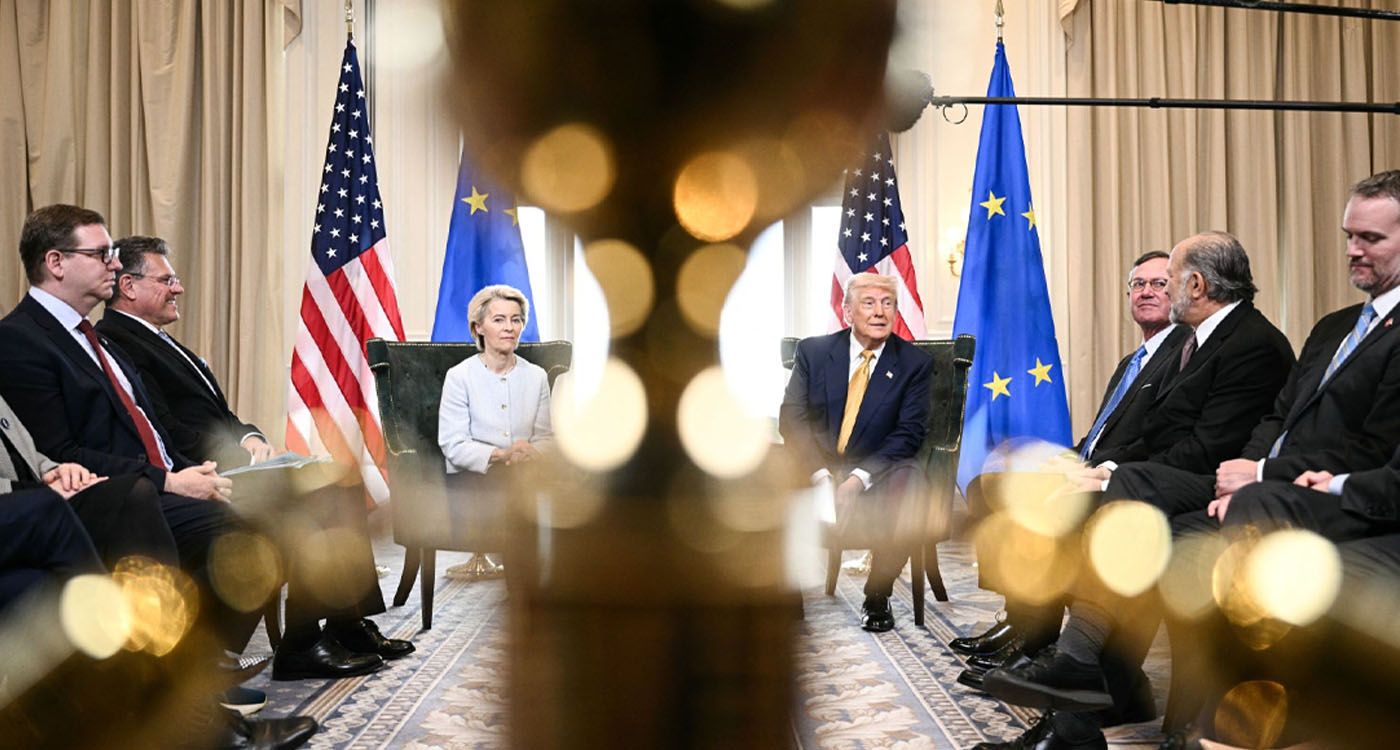- Home
- Middle East
- The Old Continent in Turnberry: Strategic Compromise or Keen Submission?

©Brendan Smialowski / AFP
A new trade agreement between the European Union (EU) and the United States was reached on Sunday in Turnberry, Scotland, after weeks of tense negotiations. The pact sets a 15% tariff on most European goods exported to the US market, narrowly avoiding a trade war, but leaving a bitter taste in Brussels.
While it marks a tariff truce, the deal has sparked criticism over the EU’s strategic weakness and raises fundamental questions about the future of the transatlantic partnership.
Avoiding Escalation
For the European Commission, the immediate goal was clear: Prevent US President Donald Trump from imposing 30% tariffs on European imports.
In exchange for a standardized 15% rate (up from the previous 10%), the EU agreed to lift some of its own tariffs, most notably the 10% levy on American cars, and committed to purchasing $750 billion worth of American energy by 2028, along with investing $600 billion in the US.
Commission President Ursula von der Leyen framed the deal as a necessary and pragmatic compromise.
An Asymmetrical Deal?
Nonetheless, behind the sense of relief lie deeper concerns. The Center for European Policy Studies (CEPS) considered the deal “bad for Europe, but better than a trade war,” lamenting the EU’s shift “from a tariff-free world to a clear step backwards.”
In fact, the agreement locks in a tariff significantly higher than the one secured by the United Kingdom, which stands at 10%. According to CEPS, this is because the UK is less targeted by the United States due to its trade deficit, unlike the EU.
Meanwhile, American think tank Atlantic Council called the Turnberry deal not a rapprochement, but rather a strategic wake-up call, “The Turnberry agreement has made it clear that the EU should no longer expect any special treatment from the United States.”
Mixed Reactions
While some countries, such as Germany and Italy, welcomed the agreement, other European voices were far more critical. French Prime Minister François Bayrou denounced “a dark day when an alliance of free peoples resigns itself to submission.”
On the other hand, German Chancellor Friedrich Merz and Italian Prime Minister Giorgia Meloni acknowledged the deal’s benefits but noted the economic cost it could impose on their respective industries.
An Ambiguous Framework
The agreement is neither a formal treaty nor a legally binding text, it remains a political framework awaiting further definition. According to CEPS, its vague status could lead to misunderstandings, “We saw the same with the US–Japan deal, where both sides interpreted the outcome differently. This could very well happen again.”
Sensitive sectors remain in limbo. Atlantic Council notes that pharmaceuticals and semiconductors are still under US investigation, with final tariff decisions pending.
Von der Leyen mentioned potential future tariff reductions on aircraft and certain agricultural goods, but the White House has yet to confirm.
Economic Uncertainty
The economic impact of the deal is hard to quantify. CEPS estimates that the EU’s GDP could shrink by 0.2% to 0.8%, with uneven effects across member states. Germany, Italy and Ireland, heavily exposed to the US market, would be most affected.
While some of the cost could be absorbed by European exporters, higher prices may be passed on to American consumers. Currency fluctuations will also matter, and the euro’s recent appreciation is already eroding European competitiveness.
As for the EU’s pledges on energy purchases and investments, Atlantic Council sees them as largely unrealistic. The promised $750 billion in US energy imports by 2028 would average $250 billion per year, roughly 75% of America’s total energy exports in 2024, which stood at around $332 billion. Fulfilling such a commitment would require the EU to absorb nearly all of America’s oil, LNG and coal exports, a scenario the think tank calls highly improbable.
Similarly, the $600 billion in European investments cited by Washington appears to aggregate previously announced plans by major companies like Volkswagen’s $20 billion and AstraZeneca’s $50 billion, rather than a coordinated EU strategy.
A Strategic Warning for Europe
“This kind of agreement, based on pressure and power dynamics, could push Europe away from its American ally in the long term,” Atlantic Council warns.
Distrust is growing in Brussels toward what many now view as an unpredictable, tactical partner.
Von der Leyen emphasized recent EU trade deals with Mexico, Indonesia, Mercosur and India, thus sending a clear signal that Europe is seeking to diversify its global partnerships.
The Turnberry agreement may mark a turning point: While it averted disaster, it starkly reveals that the transatlantic relationship is shifting from one built on trust to one defined by transactions.

Comments